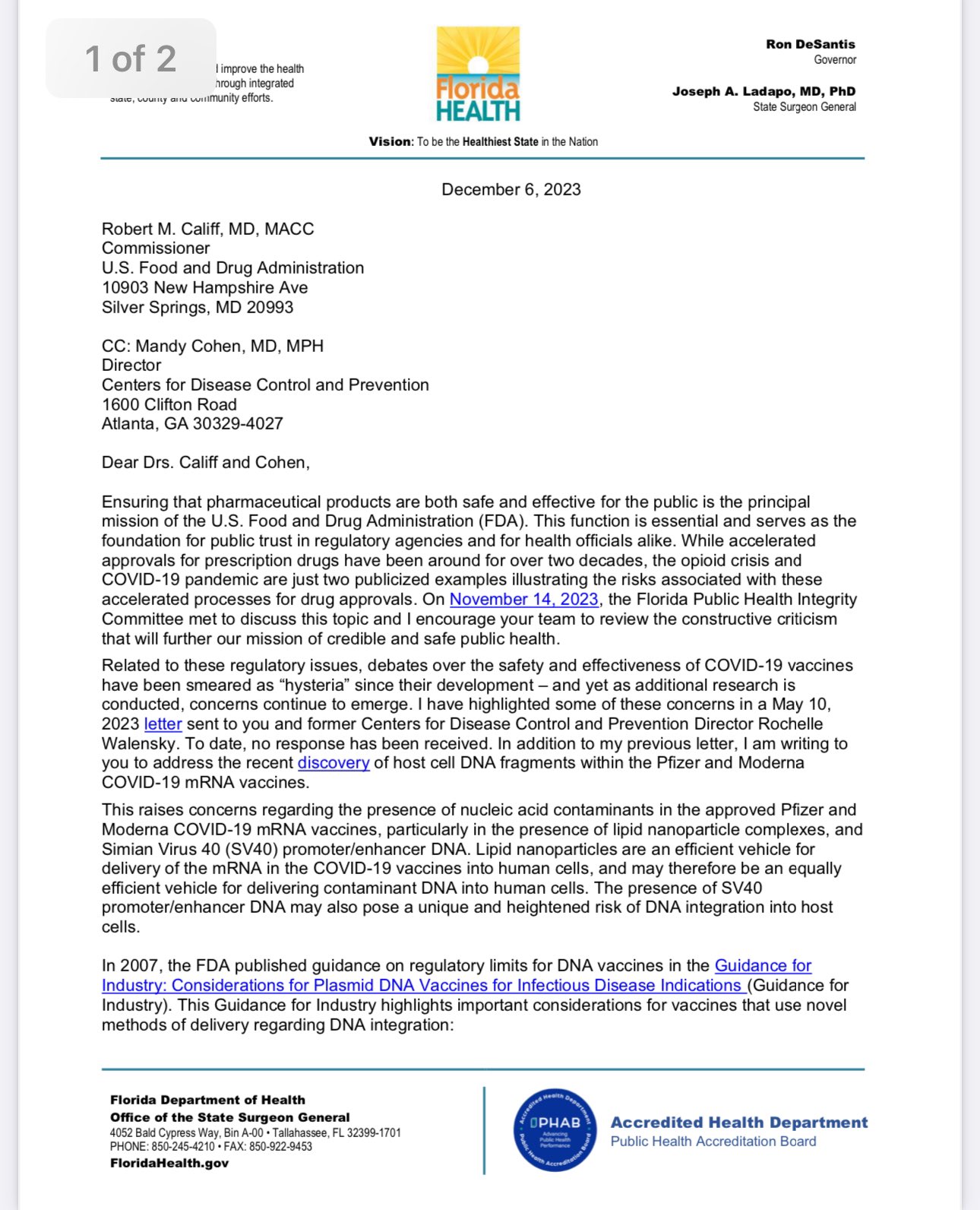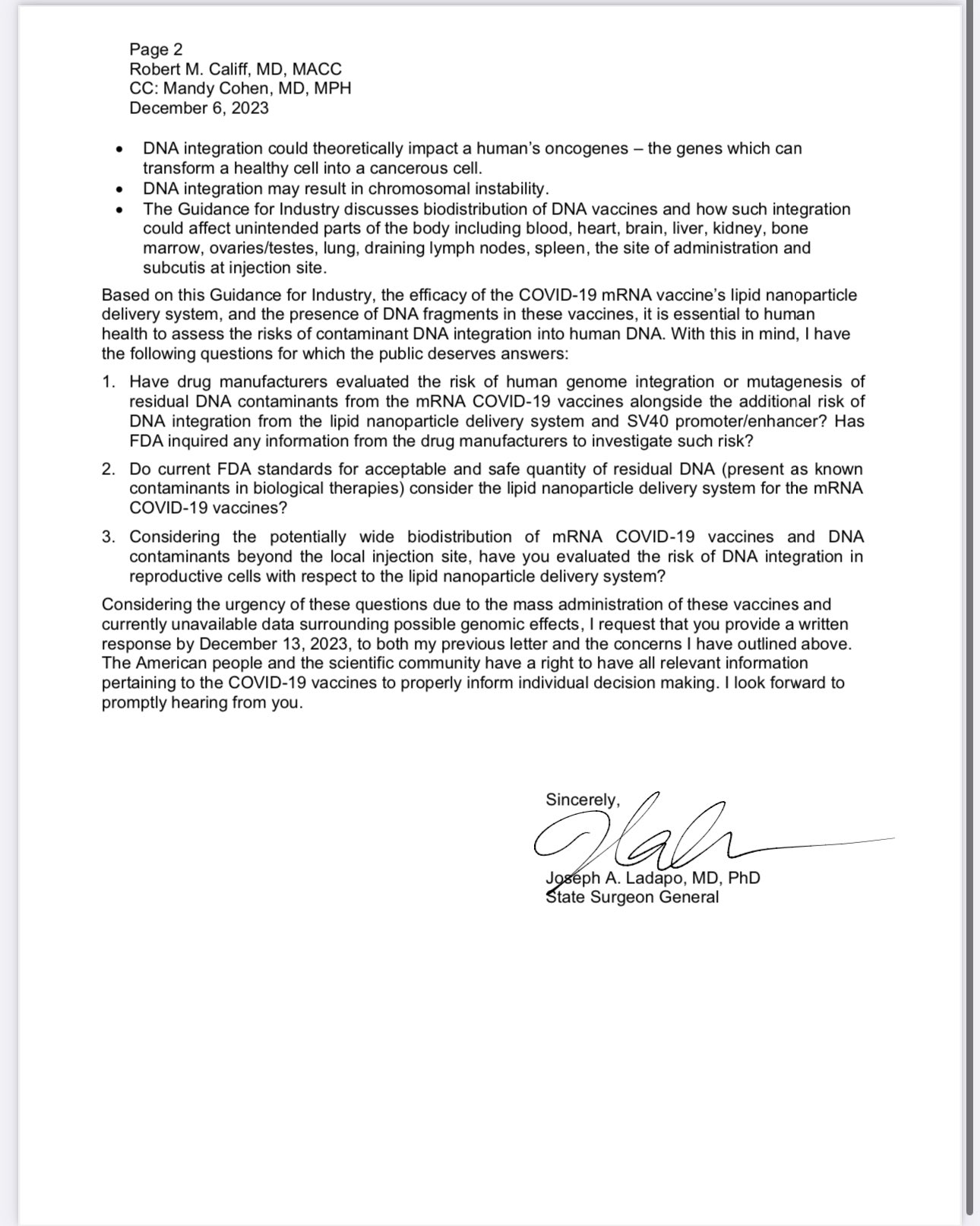Florida State Surgeon General Dr. Joseph A. Ladapo has called to halt the usage of all mRNA COVID-19 injections.
Ladapo cited “concerns regarding nucleic acid contaminants in the approved Pfizer and Moderna COVID-19 mRNA vaccines, particularly in the presence of lipid nanoparticle complexes, and Simian Virus 40 (SV40) promoter/enhancer DNA.”
“The U.S. Food and Drug Administration and the Centers for Disease Control and Prevention have always played it fast and loose with COVID-19 vaccine safety, but their failure to test for DNA integration with the human genome – as their own guidelines dictate – when the vaccines are known to be contaminated with foreign DNA is intolerable,” Ladapo said.
I am calling for a halt to the use of mRNA COVID-19 vaccines. pic.twitter.com/olg8VTh6gB
— Joseph A. Ladapo, MD, PhD (@FLSurgeonGen) January 3, 2024
“On December 6, 2023, State Surgeon General Dr. Joseph A. Ladapo sent a letter to the United States Food and Drug Administration (FDA) Commissioner Dr. Robert M. Califf and Center for Disease Control and Prevention (CDC) Director Dr. Mandy Cohen regarding questions pertaining to the safety assessments and the discovery of billions of DNA fragments per dose of the Pfizer and Moderna COVID-19 mRNA vaccines,” the Florida Department of Health stated in a press release.
“The Surgeon General outlined concerns regarding nucleic acid contaminants in the approved Pfizer and Moderna COVID-19 mRNA vaccines, particularly in the presence of lipid nanoparticle complexes, and Simian Virus 40 (SV40) promoter/enhancer DNA. Lipid nanoparticles are an efficient vehicle for delivery of the mRNA in the COVID-19 vaccines into human cells and may therefore be an equally efficient vehicle for delivering contaminant DNA into human cells. The presence of SV40 promoter/enhancer DNA may also pose a unique and heightened risk of DNA integration into human cells,” it added.
‼️JUST IN: Florida State Surgeon General Joseph Ladapo Calls for Halt in the Use of COVID-19 mRNA Vaccines! pic.twitter.com/cfp2RbpZqW
— Chris Nelson 🇺🇸 🏝 (@ReOpenChris) January 3, 2024
From the Florida Department of Health:
In 2007, the FDA published guidance on regulatory limits for DNA vaccines in the Guidance for Industry: Considerations for Plasmid DNA Vaccines for Infectious Disease Indications (Guidance for Industry). In this Guidance for Industry, the FDA outlines important considerations for vaccines that use novel methods of delivery regarding DNA integration, specifically:
- DNA integration could theoretically impact a human’s oncogenes – the genes which can transform a healthy cell into a cancerous cell.
- DNA integration may result in chromosomal instability.
- The Guidance for Industry discusses biodistribution of DNA vaccines and how such integration could affect unintended parts of the body including blood, heart, brain, liver, kidney, bone marrow, ovaries/testes, lung, draining lymph nodes, spleen, the site of administration and subcutis at injection site.
On December 14, 2023, the FDA provided a written response providing no evidence that DNA integration assessments have been conducted to address risks outlined by the FDA themselves in 2007. Based on the FDA’s recognition of unique risks posed by DNA integration, the efficacy of the COVID-19 mRNA vaccine’s lipid nanoparticle delivery system, and the presence of DNA fragments in these vaccines, it is essential to human health to assess the risks of contaminant DNA integration into human DNA. The FDA has provided no evidence that these risks have been assessed to ensure safety.
MORE: @FLSurgeonGen said the FDA has not adequately assessed the risk of certain contaminants in the vaccines in causing cancer, other "unintended" impacts
"DNA integration poses a unique and elevated risk to human health."https://t.co/c1gRAUZSHS
— Florida’s Voice (@FLVoiceNews) January 3, 2024
“The FDA’s response does not provide data or evidence that the DNA integration assessments they recommended themselves have been performed. Instead, they pointed to genotoxicity studies – which are inadequate assessments for DNA integration risk. In addition, they obfuscated the difference between the SV40 promoter/enhancer and SV40 proteins, two elements that are distinct,” Ladapo said in a statement.
“DNA integration poses a unique and elevated risk to human health and to the integrity of the human genome, including the risk that DNA integrated into sperm or egg gametes could be passed onto offspring of mRNA COVID-19 vaccine recipients. If the risks of DNA integration have not been assessed for mRNA COVID-19 vaccines, these vaccines are not appropriate for use in human beings,” he continued.
“Providers concerned about patient health risks associated with COVID-19 should prioritize patient access to non-mRNA COVID-19 vaccines and treatment. It is my hope that, in regard to COVID-19, the FDA will one day seriously consider its regulatory responsibility to protect human health, including the integrity of the human genome,” he added.
Florida’s Voice wrote:
The CDC has maintained the vaccines are “safe and effective.”
Ladapo was reconfirmed as surgeon general in 2023, appointed by Gov. Ron DeSantis in late 2021.
In August, Ladapo slammed the notion of pushing the vaccines on children, calling it “insane.”
And in March, nearly a year ago, Ladapo said he doesn’t believe anybody should take the mRNA vaccines over their “terrible safety profile.”
“These vaccines have a terrible safety profile at this point in the pandemic,” he said. “You know, I’m not sure anyone should be taking them and that’s [the] honest truth.”
The Florida Department of Health has also trailblazed an opposition to the vaccine. In September, it advised against anyone under the age of 65 from obtaining the COVID-19 booster.
In October 2022, Florida recommended against men aged 18-39 from receiving the mRNA COVID-19 vaccines over cardiac risk concerns.
“Studying the safety and efficacy of any medications, including vaccines, is an important component of public health,” Ladapo said. “Far less attention has been paid to safety and the concerns of many individuals have been dismissed – these are important findings that should be communicated to Floridians.”









